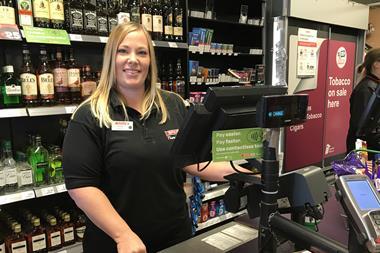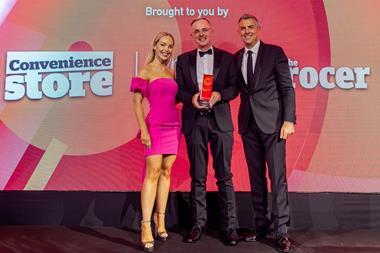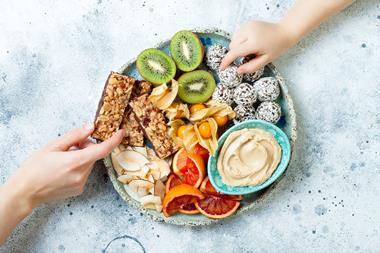Our C-Store Champions agree that providing a quick and friendly service and finding a USP are vital to fending off the competition
Calum Duncan, manager of Crown Stores in Inverness
Calum hopes becoming a Premier will help him offer more promotions and extend his alcohol range
Raj Aggarwal, owner of Spar Hackenthorpe in Sheffield
Raj is preparing for a Lidl store to open nearby and plans to push promotions to show he offers value
Sid Ali, owner of five Nisa stores in Aberdeenshire
The ‘family-owned’ message is important for Sid to help his store stand out from the competition
Richard Inglis, Welcome Co-op franchisee
It’s important not to get too wrapped up in what your competition is doing and neglect your own strengths, advises Richard
What is your main competition and how has this changed over the years?
Raj: We have had a Tesco store nearby for a few years, but we will have a Lidl opening about three-quarters of a mile down the road towards the end of this year. Unfortunately, new competition opening is something you can’t avoid and I know that when it first opens we are going to see a significant hit to our sales simply because shoppers will want to see what the new store is all about. The important thing will be to get that loyalty back after that initial few weeks.
Sid: At our Mintlaw store we used to have an independently-owned Spar petrol station nearby, then that family sold to a big chain, then they became a franchise which gave them a huge buying power. There also used to be a family-owned Costcutter store nearby, but when a new 3,000sq ft Co-op came along four years ago that family couldn’t make money any more and had to sell the store to Costcutter. The problem for any independent retailer is they can’t predict how new competition is going to affect them. A multiple can look at all their branches and work off historic insight, but we just have to wait and see what categories will be hit and then make changes accordingly.
Calum: The nearest competition is an M&S and next to that is a Morrisons. The quantity of competition in the area hasn’t changed for many years, but that Morrisons used to be a Sainsbury’s. Luckily we are at the top of a hill and we find a lot of people don’t want to walk down the hill and back up again to go to the other shops. We have a lot of elderly and affluent shoppers and they tend to choose convenience over price.
Richard: We’ve got all sorts of competition, from all angles. At one of our stores there’s a big Asda nearby and quite a few small independent shops ranging from the Premier Booker sorts to the more CTN-style shops, so there’s a real mix. The biggest danger to us would be a Southern Co-op as they would offer a similar range to us.
What are your competition’s greatest strengths? Have you adapted the way you work in light of these?
Raj: Price is their greatest strength. It’s hard for us to compete sometimes, but I think we are pretty much on a par with the Tesco store’s prices. We promote our special offers as much as possible and make people aware they can get good value for money with us.
Sid: When the Co-op opened we had an initial drop of 20-25%, which is pretty standard. Our chilled section was the biggest hit, though since Nisa was bought by Co-op we’ve been able to start selling the same chilled products so we can compete. When they first opened we bought another local village store which we knew had been badly hit by the Co-op and this gave us a bit of extra buying power. We increased sales at that store by £6,000-£7,000, which recovered the losses at our first store but, of course, we still have to deal with the extra overheads associated with having the extra store. The Co-op, surprisingly, has a very competitive tobacco range – you’ll find they’re about 35p below the rrp. The other thing we noticed when the Co-op opened was half the kids from the secondary school started disappearing off there at lunchtime so we started doing special deals on over-the-counter soft scoop ice cream for kids in school uniform. You can imagine how popular this was before the summer holidays with the weather we had. When the schools go back we will probably do something like 50p off sandwiches. We also offer mums and dads money off their coffee-to-go during the school run hours.
Calum: M&S and Morrisons are both very good at fresh produce so we stay away from that and stick to what we are best at – the essentials.
Richard: A store such as Asda is so big that it can offer everything the shopper needs. We make sure to offer something unique to our shoppers that they can’t get in Asda. Slush, for example, is a popular offer.
What is your store’s main USP?
Raj: Definitely customer service. Customers like to come to us, they like the banter and that their shopping trip is quick and easy.
Sid: We use our ‘family-owned store’ angle in our favour when promoting our store, and people do appreciate that we live and work in the area. If there’s an event going on locally then we provide products. We offer lots of different items that you can’t get anywhere else. We sell tubs of 10 scoops of our soft-scoop ice cream for £9. This allows the shopper to create a personalised product and gives us a great margin.
Calum: The customer service angle is our USP. We always make sure we have enough tills open that people don’t have to wait. This convenience is what shoppers want.
Richard: The main thing we can do is change our offering very quickly to match our shoppers’ needs as we see trends appear. For example, a few years ago Polish food and drink was a big thing so we did a lot of that, but then some specialist shops opened and it became hard to compete so we stopped. Then shoppers got really into American candy, snacks and soft drinks, but then the novelty of that wore off a bit and the sugar tax made it harder to source the soft drinks at a reasonable price so we pulled out of that. Our big thing now is our Cook frozen range which is providing a great USP.
How do you see your competition changing over the coming years?
Raj: Online shopping is more of a threat to the multiples, which is good news for independents. All the consolidation in the market is interesting. It’s possible Spar could end up consolidating with a multiple, which could give us an edge.
Sid: Where we have new housing developments springing up we are seeing increasing sales, but we don’t want so many new houses that the area then appeals to any multiples.
Calum: We have new sheltered accommodation going up so we are hoping to get new customers for newspapers, if nothing else. We are planning to convert to Premier at the beginning of next year as that will mean we will be able to offer more promotions and a better range and sell more alcohol.
Richard: We used to have multiples opening left, right and centre, but that’s calmed down a bit now. I think the key, as always, will be to ensure we are constantly raising our game by continuing to invest in our stores.
Do you feel that customers are less loyal than they used to be? How can you retain their loyalty?
Raj: Definitely. Customers are much more price driven now. To a degree they will still come to us regularly to pick up bread and milk when they run out, but they will shop at lots of other stores, too. They won’t just stick to one shop.
Sid: Customers only have habits, not loyalty, and if another retailer breaks that habit then you’ve lost that customer. We know that some customers know exactly how much milk costs while others don’t care as long as they can get it conveniently. We have created a deal which offers the best for both types of customer. We used to sell 2ltr milk for £1, but we started to do two for £1.89, or one for £1.39. People thought I was mad to give away milk at such low prices, but I took a gamble that not everyone would choose to buy two, because most only need one, and my gamble paid off. The average price a shopper now spends on milk is £1.16 and those who are value focused are happy with their great deal while those who just want convenience don’t even notice the price. That’s the benefit of being able to change according to your shoppers’ needs.
Calum: Yes, I think people are happy to change where they shop but we are lucky that people keep coming to us because of our location. People pick convenience over loyalty.
Richard: I think they are less loyal than they used to be. Customers are interested in getting a good deal, but also want good customer service. You have to provide customer service, price and quality.
What advice would you give to other retailers dealing with competition similar to yours?
Raj: It’s bound to have an effect on business in the short term, but the important thing is to do what you do best as well as you possibly can and if you are doing things well then, ultimately, there’s no reason why your shoppers won’t come back to you.
Sid: Don’t be scared to try something new.
Calum: Join a symbol group so you can be more competitive and don’t stick to just one supplier. If you have several suppliers then you can compare prices and choose what works for you.
Richard: For us the big thing has been not to obsess about them and concentrate on what we do best, because if you worry too much about what others are doing you can lose focus.
Tactics
What are your competition’s greatest weaknesses? How have you used these to your advantage?
Raj: Customer service. We’ve been in this area for years and understand the customer better so we can provide them with a personal service. I am the face of the business, rather than a big company, so we can provide that human element.
Sid: Really, a Co-op is the best of the worst in terms of the type of competition we could be up against. We wouldn’t like a multiple because they can fulfil the top-up shop mission, or a discounter because they offer the cut prices, or another independent because they are so unpredictable. Co-op doesn’t have a good spirits selection.
Calum: Morrison’s greatest weakness is definitely their customer service. I think it’s hard to find good customer service these days, but we believe we offer excellent service.
Richard: Asda’s strength is also its weakness in that people find it a pain to go to a big shop if they only need a couple of items. Convenience is our strong point and we ensure to keep the store clean, well laid out and our customer service to a high level.
Adapting to the competition
What new goods and services have you added to minimise the effects of competition in recent years?
Raj: We like to try to find interesting and quirky products that you wouldn’t find in a multiple, such as slushies. We also stock a lot of Polish products which come with very low rrps, such as big bags of Cheetos for just £1, which are very popular. We also do a big range of American confectionery and snacks.
Sid: We’ve launched a new initiative to try to boost loyalty. We noticed our newspaper sales were down and so looked at who buys newspapers and decided to create a deal for people aged over 65. We offer them 20p off per paper per day, which has led to a 10% increase in newspaper sales. We know this has improved loyalty because there was one morning when our sales assistant was 15 minutes late to open the store and people waited outside the door rather than going down the road to the competition because they wanted their discount.
Calum: We’ve brought in a new coffee machine which has been really popular. We have a baker next door and a café and a deli which all do coffee, but we are cheaper than them all. The machine is a Rijo42.
Richard: We’ve decided to do the opposite and take some products out in order to ensure our customer service remains high. We plan to remove the PayPoint service from our stores early next year as we’ve decided it’s not worth the time put in by our staff. We will sometimes have queues form due to someone using the service, who isn’t buying anything in store, and we want to ensure we put customer service and speed of service first.
Source
Nikki Cutler

















![C-Store_Champions_logo-CHOSEN[1] 2023](https://d2dyh47stel7w4.cloudfront.net/Pictures/380x253/6/5/7/301657_cstore_champions_logochosen12023_817064.jpg)




No comments yet